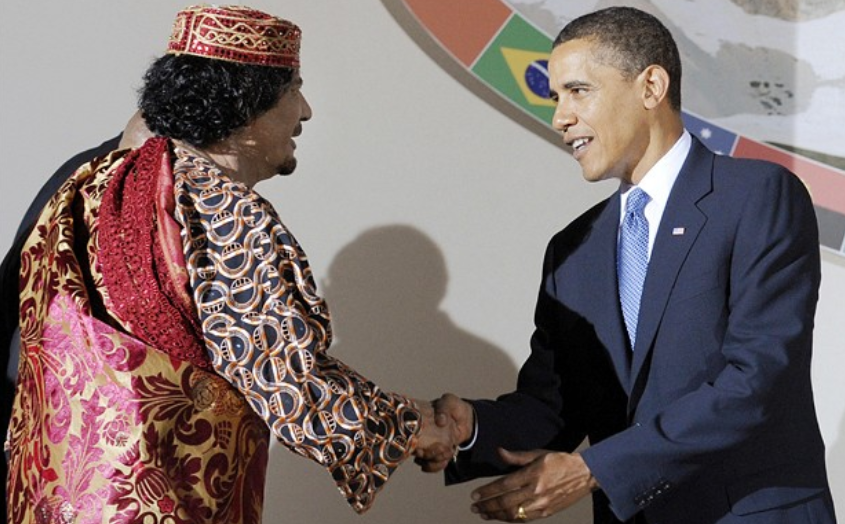US policymakers have long conspired to broker what would be meant to appear as a historic deal with the political order in Tehran. It would be a deal almost unreasonably compromising for the United States, in order to enhance the illusion that the West sought every means to integrate Iran peacefully back into the “international community” before resorting to armed and direct military aggression.
Knowing that Iran will never exist within Washington, Wall Street, London, and Brussels’ “international order” as an obedient client state, a prescription for regime change in Tehran has long been formulated. Best summarized in the 2009 Brookings Institution paper titled, “The Path to Persia: Options for a New American Strategy toward Iran” (.pdf), this regime change formula includes absolutely everything from economic sanctions and US-backed political upheaval, to the use of terrorism and proxy war to undermine and overthrow Iranian sociopolitical stability and eventually the Iranian state itself.
In the lengthy 220-page document, Brookings policymakers acknowledge the necessity to first neutralize Syria before moving against Iran itself. It also prescribes the delisting of US State Department foreign terrorist organizations in order for the US to then arm and back them in a proxy war against Tehran. Among the terrorist organizations mentioned was Mojahedin-e-Khalq (MEK), a terrorist organization guilty of years of violence including the kidnapping and murder of American service members and American civilians. MEK has also continued carrying out terrorist attacks against political and civilian targets in Iran up to present day.
It should be noted that these 2009 “suggestions” eventually manifested themselves as the current, ongoing conflict in Syria and Iraq where US, Saudi, and Turkish-backed terrorists are waging war against Syrian, Iraqi, Iranian, and Russian backed political and military fronts, as well as the eventual delisting of MEK.
 It is clear then, that the Brookings paper was more than a collection of mere suggestions. It was an anthology of various operations arrayed against Tehran either ongoing or in the planning stages as of 2009.
It is clear then, that the Brookings paper was more than a collection of mere suggestions. It was an anthology of various operations arrayed against Tehran either ongoing or in the planning stages as of 2009.
The only scenarios that have not yet been implemented were those dealing with full-scale war by the West against Tehran predicated on either a staged provocation, or a “superb offer” the Iranians “rejected” or failed to fulfill that justified direct Western – including Israeli – aggression.
Brookings’ “Superb Offer…”
Brookings policymakers themselves openly admitted in “Which Path to Persia?” that (emphasis added):
…any military operation against Iran will likely be very unpopular around the world and require the proper international context—both to ensure the logistical support the operation would require and to minimize the blowback from it. The best way to minimize international opprobrium and maximize support (however, grudging or covert) is to strike only when there is a widespread conviction that the Iranians were given but then rejected a superb offer—one so good that only a regime determined to acquire nuclear weapons and acquire them for the wrong reasons would turn it down. Under those circumstances, the United States (or Israel) could portray its operations as taken in sorrow, not anger, and at least some in the international community would conclude that the Iranians “brought it on themselves” by refusing a very good deal.
Considering that every other option in the Brookings paper has either been openly tried since 2009, or is in the process of being executed currently, it would be folly for readers to believe that this “superb offer” is not in reference to the “nuclear deal,” and that it is not somehow going to play out precisely as US policymakers have schemed for years.
For those that do doubt the “nuclear deal” is anything but a “superb offer” US policymakers fully plan to use against Tehran in the near to intermediate future, evidence that the West has no intention of accommodating Iran’s current political order or accept its growing geopolitical influence across the Middle Eastern and North African region (MENA), can be seen in neighboring Syria and amid the ongoing conflict still raging there. Skeptics can also consider the war in Yemen, and continued meddling by the US everywhere from North Africa to Central Asia – particularly in Afghanistan which lies along Iran’s eastern border.
Syria in particular has long been acknowledge to be a proxy war between the West and Iran, and to a greater extent, between the West and Russian-Chinese influence.
This Book Could Save Your Life (Ad)
As early as 2007 – a full 4 years before the 2011 “Arab Spring” and the war in Syria would begin – Pulitzer Prize-winning journalist Seymour Hersh in his New Yorker article titled, “The Redirection: Is the Administration’s new policy benefiting our enemies in the war on terrorism?” would warn specifically (emphasis added):
To undermine Iran, which is predominantly Shiite, the Bush Administration has decided, in effect, to reconfigure its priorities in the Middle East. In Lebanon, the Administration has cooperated with Saudi Arabia’s government, which is Sunni, in clandestine operations that are intended to weaken Hezbollah, the Shiite organization that is backed by Iran. The U.S. has also taken part in clandestine operations aimed at Iran and its ally Syria. A by-product of these activities has been the bolstering of Sunni extremist groups that espouse a militant vision of Islam and are hostile to America and sympathetic to Al Qaeda.
Continued Western involvement in the Syrian conflict is a constant affirmation of the West’s true intentions of undermining and overthrowing Iran. Rapprochement is at best a clumsy, tired ploy being used to coax Iran entirely out from behind its existing strategy and its regional alliances, as well as to split Iranian society internally with promises of wealth and prosperity in the wake of this so-called “nuclear deal.”
Other nations have been lured out into the open with such promises – nations like Libya.
The Ghosts of Libyan Rapprochement
It would be hoped that Iran understands that it is by no means “exceptional,” and that no matter how tempting the West’s “superb offer” may seem, that Tehran would prepare fully for betrayal, suddenly and completely, by those brokering it. This hope for Iranian caution would be based on the assumption that Tehran watched and understood the full process of Libya’s destruction.
 Libya, too, was promised rapprochement with the West if only it abandoned its traditional alliances, released thousands of dangerous prisoners – members of terrorist organizations that would later be arrayed against Tripoli – and “cooperate” with the West in a variety of economic and military endeavors. With Libya lured out into the open, the West quickly armed and funded the very prisoners it convinced Tripoli to release, provided them with NATO aircover, and systematically destroyed the nation of Libya.
Libya, too, was promised rapprochement with the West if only it abandoned its traditional alliances, released thousands of dangerous prisoners – members of terrorist organizations that would later be arrayed against Tripoli – and “cooperate” with the West in a variety of economic and military endeavors. With Libya lured out into the open, the West quickly armed and funded the very prisoners it convinced Tripoli to release, provided them with NATO aircover, and systematically destroyed the nation of Libya.
In the end, Libyan leader Muammar Qaddafi was cornered with the help of French and American military assets, and brutally killed at roadside by militants who would later form the foundation of the so-called “Islamic State” (ISIS) in Libya. Today, Libya as a functioning nation-state no longer exists. After genocidal purges and continued internal war, the country is divided with two “governments” and hordes of armed groups existing in anarchy.
With the nation divided and destroyed, the US and its European allies are incrementally invading and occupying what is left, taking over oilfields with the intention of pilfering what is left of Libya’s once vast wealth and resources. Libya, as it exists today, will likely remain weak and subjugated by Western control for decades to come – not unlike Libya under European control (British, Italian, and French) before Libya achieved independence.
Iran too has followed a similar path – from being subjugated directly by Anglo-American interests or ruled by Western-controlled client states, to an independent nation besieged by its former colonial masters seeking to regain their lost holdings. Like Libya, Iran is being lured out into the open.
By lifting sanctions, Iranian hydrocarbons will flood international markets, further weakening Iran’s allies in Moscow and Beijing. When the time is right, the “nuclear deal” will be turned against Tehran, and without Moscow or Beijing in a position to aid Tehran, it will fall just as Libya did.
US policymakers have literally penned, signed, and dated documented conspiracies to use a “superb offer” as a means not of restoring ties with Iran, but of undermining and destroying it. US policymakers have demonstrably done precisely this to both Libya, and in many ways, to Syria. The US is to this day still arming, funding, and backing a terrorist army in neighboring Syria with the intention of destroying several of Iran’s most crucial allies – not only the government in Damascus, but also Lebanon’s Hezbollah. The US is still engaged in military operations along Iran’s eastern borders in Afghanistan.
 In the game of geopolitics, Iran’s current predicament could not be any more obvious, nor any more dangerous. This is not the beginning of a new and hopeful chapter between Iranian and Western relations. It is but a shift in tactics and public perception that will bring with it a new array of challenges for Tehran and its allies to navigate.
In the game of geopolitics, Iran’s current predicament could not be any more obvious, nor any more dangerous. This is not the beginning of a new and hopeful chapter between Iranian and Western relations. It is but a shift in tactics and public perception that will bring with it a new array of challenges for Tehran and its allies to navigate.
Western backed terrorists surging in Syria and Iraq, form the very same dagger once aimed at Libya’s back. This “superb offer” by the US seeks to take down Iran’s guard so this dagger can be sunk fully into the Iranian state.
Tony Cartalucci, Bangkok-based geopolitical researcher and writer, especially for the online magazine“New Eastern Outlook”.


If Iran plays its cards right, the West will have no pretext to claim its “superb offer” was rejected. As more and more Western business groups invest in Iran, this option will gradually evaporate. The best laid plans………………………………….
Much like what happened in Afghanistan, Libya and elsewhere? I believe your comment about the “best laid plans” sets up the Iranians because the ultimate goal is their obedience and subservience. Which leads me to ask why is the US gov the only arbiter of what everyone else must do?
Iran cannot be compared to Afghanistan or Libya, or even Iraq. rI is bigger, stronger, more educated, and has powerful alliances with Russia and other nations resisting US hegemony.
I do not think the plans for Afghanistan, Iraq, or Libya were acieived; these examples show how the best laid plans can backfire: Afghanistan is poised to fall into Taliban hands; Iraq is tightly linked now to Iran, and Libya is a breeding ground for ISIS.
The US is not the only arbiter but it aspires to be; in fact, its efforts since in the past 25 years have all backfired and served only to make the US weaker, less respected, and more indebted.
Actually my comparison was spot on when measured against a group of people that should not be subjected to the arbitrary edicts of a gov hell bent on making the world into the image it wants; aka hegemonic or colonialism either works.
With the exception of you saying the US is not the sole arbitrator I can completely agree with your last paragraph.
So when looking at the list of what the US gov drives for ( world domination) look at nearly any nation in the world and you will see many that are referred to as client, puppet or vassel states. The game is bigger than that but the playbook seems fairly easy to read.
I agree that no nation should be made a vassal of another, but that is not to say that Afghanistan or Libya in anyway can be compared to Iran in terms of resisting imperial designs. Your comparison is flawed ot in the opposition to US domination but in comparing very weak, small nations with a powerful, much larger and more sophisticated society allied, as Afghanistan, Iraq, and Libya were not, with Russia.
The BRICS nations have nearly have the world’s population and pose a counter to US being the “sole arbitrator.” The US can impose sanctions on Russia but it cannot crush its independence; likewise with China.
The world is evolving to a mutli-polar order to challenge the US ambition to the the sole arbitrator. Even Europe is breaking with the US due to the US attitude of “F….K the EU” as well as nations in Latin America like Venezuela, Ecador, Brazil, and of course China and India.
Wanting to rule the entire world is an ambition, not a reality. And US failures in Afghanistan, Iraq, Syria, Ukraine, and Libya are evidence that US plans not only are failing but were not, in the first case, well-laid.
Until we create democracy at home, the dangerous game of seeking hegemony will continue to subject the world to chaos, conflict, and destruction.
Someone who studied political science at Harvard and Berkeley who doesn’t know the globalists created China as their model technocracy and China and Russia are deeply economically integrated into the same Rockefeller/ Rothschild IMF and BIS banking cartel as the rest of the world?
Multi-polar is the next paradigm for the global elite as they move towards the adoption of their global digital currency and global governance system of management – the outgrowth of the trade agreements, among other tactics.
Technocrats are being installed in the highest govt positions around the world – openly.
You are entitled to your opinion, for which you offer no suppport.
America’s problems are made in America!
Indeed, what we ordinary people see as problems (median wages down 40% since 1989) the elites who run things see as solutions (low wages with govt subsidies as a way to maximize profits; subsidies for offshoring jobs, loopholes allowing legal tax dodging, etc). What we experience as suffering is the lost wealth which the rich have extracted by controlling the political process by subverting democratic rule.
And many, if not most of the problems of the world, in the the same inverted manner, are made in America!
Made also in the City of London (international banking cartel). Dale says the US is weaker but this is a limited hangout as the US has been, by design, the heart of the globalist empire to create world government, overseen by the UN. We have to own up to the apathy that allowed the deep capture to take root. We also have to see the long term agenda for what it is.
No “double cross” because Iran began adopting World Bank / BIS / IMF economic structural reforms (the global bankster neoliberalization model) in the 1990s after the Iran-Iraq war and has steadily continued this process without interruption. Iran signed on to the Rio 1992 Agenda 21 program and recently signed onto the 2030 Agenda representing the next big Globalist transformation for the NWO. There is no resistance by Iran’s political leadership to the NWO and hasn’t been for a long time. They have been assimilated and all of this information can be easily verified in relatively quick searches.
The next phase of the NWO global technocracy is heavily dependent on the SMART systems and in the gorgeous brochure in the link below Iran’s wholehearted embrace of Big Brother Tehran Smart City (including adoption of electronic cards for transportation) along with UN Sustainability programs is described and illustrated with photographs.
en.tehran.ir/Portals/0/Document/Tehran%20towards%20Prosperity%20and%20Equity.pdf